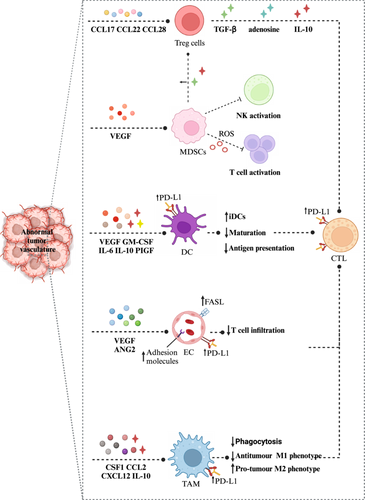MedComm-Oncology | Enhancing cancer immunotherapy and antiangiogenic therapy by regulating gut microbes: Opportunities and challenges

Open the phone and scan

Immune suppressive microenvironment induced by abnormal tumor vasculature. Hypoxia and acidosis in the tumor microenvironment (TME) are caused by vascular abnormalities in the tumor, which in turn can lead to immunosuppression. For example, the recruitment of immunosuppressive regulatory T cells (Tregs) and tumor-associated macrophages (TAMs), dendritic cell (DC) maturation, and the expansion of abnormal endothelial cells (ECs) were inhibited. Importantly, the programmed cell death protein-1 (PD-1)–programmed cell death 1 ligand 1 (PD-L1) pathway is heavily activated in the TME, allowing the tumor to evade immune cell monitoring. In addition, tumor-infiltrating CTLs also upregulate the expression of PD-1, marking their “senescence” and limiting their antitumor function. ANG2, angiopoietin 2; CCL2, C-C-motif chemokine ligand 2; CCL17, C-C-motif chemokine ligand 17; CCL22, C-C-motif chemokine ligand 22; CCL28, C-C-motif chemokine ligand 28; CSF1, macrophage colony-stimulating factor 1; CTLs, cytotoxic T lymphocytes; CXCL12, C-X-C-motif chemokine ligand 12; FASL, FAS antigen ligand; GM-CSF, granulocyte–macrophage colony-stimulating factor; iDCs, immature dendritic cells; IL-6, interleukin 6; IL-10, interleukin 10; MDSCs, myeloid suppressor cells; NK, natural killer cell; PIGF, placental growth factor; ROS, reactive oxygen species; TGF-β, transforming growth factor β; VEGF, vascular endothelial growth factor.
As the largest microecosystem in the human body, gut microbes (GMs) and their metabolites play an important role in regulating human health. In recent years, immune checkpoint therapy (ICT) combined with antiangiogenic agents is an emerging combination therapy for cancer. There is growing evidence that GMs can affect the effectiveness of drugs to treat cancer. GMs not only regulate angiogenesis in the tumor microenvironment, but also influence the efficacy of immune checkpoint inhibitors. Many studies show that Bifidobacterium can upregulate the anticancer function of immune checkpoint blockers. In addition, GMs have been found to be involved in the formation of blood vessels and other developmental processes. Clinically, GMs are believed to play a key role in patients receiving antiangiogenic therapy and ICT. In this perspective, we provide an overview of the composition and function of the gut microbiome, and discuss the role of the GMs against the conditioning of angiogenic therapy and ICT. We also summarize new approaches and clinical translational trials using GMs for cancer therapy, and present opportunities and challenges for targeting GMs for cancer therapy in the future.
Article Access: https://doi.org/10.1002/mog2.85
More about MedComm-Oncology: https://onlinelibrary.wiley.com/journal/27696448
Looking forward to your contributions.


